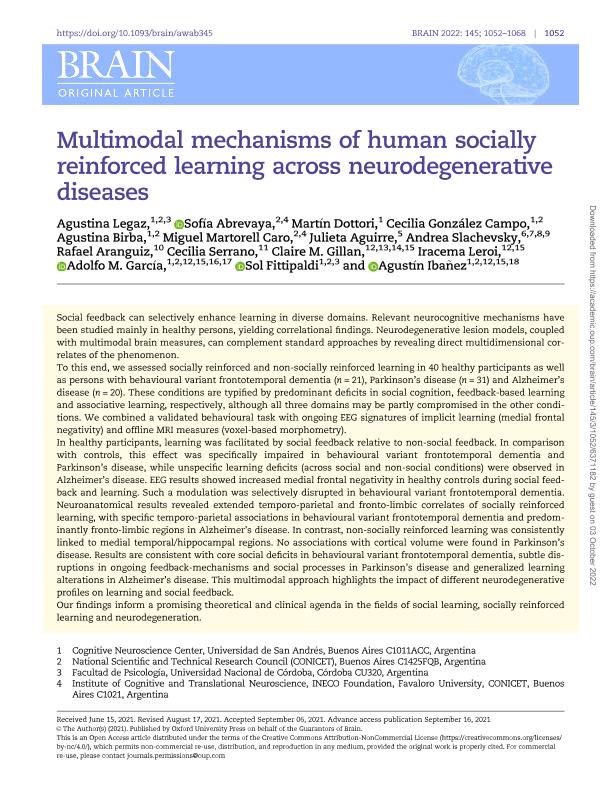Artículo
Multimodal mechanisms of human socially reinforced learning across neurodegenerative diseases
Legaz, Agustina ; Abrevaya, Sofia
; Abrevaya, Sofia ; Dottori, Martín; Campo, Cecilia González; Birba, Agustina
; Dottori, Martín; Campo, Cecilia González; Birba, Agustina ; Martorell Caro, Miguel Angel
; Martorell Caro, Miguel Angel ; Aguirre, María Julieta
; Aguirre, María Julieta ; Slachevsky, Andrea; Aranguiz, Rafael; Serrano, Cecilia Mariela; Gillan, Claire M.; Leroi, Iracema; García, Adolfo Martín
; Slachevsky, Andrea; Aranguiz, Rafael; Serrano, Cecilia Mariela; Gillan, Claire M.; Leroi, Iracema; García, Adolfo Martín ; Fittipaldi, Sol; Ibañez, Agustin Mariano
; Fittipaldi, Sol; Ibañez, Agustin Mariano
 ; Abrevaya, Sofia
; Abrevaya, Sofia ; Dottori, Martín; Campo, Cecilia González; Birba, Agustina
; Dottori, Martín; Campo, Cecilia González; Birba, Agustina ; Martorell Caro, Miguel Angel
; Martorell Caro, Miguel Angel ; Aguirre, María Julieta
; Aguirre, María Julieta ; Slachevsky, Andrea; Aranguiz, Rafael; Serrano, Cecilia Mariela; Gillan, Claire M.; Leroi, Iracema; García, Adolfo Martín
; Slachevsky, Andrea; Aranguiz, Rafael; Serrano, Cecilia Mariela; Gillan, Claire M.; Leroi, Iracema; García, Adolfo Martín ; Fittipaldi, Sol; Ibañez, Agustin Mariano
; Fittipaldi, Sol; Ibañez, Agustin Mariano
Fecha de publicación:
03/2021
Editorial:
Oxford University Press
Revista:
Brain
ISSN:
0006-8950
Idioma:
Inglés
Tipo de recurso:
Artículo publicado
Clasificación temática:
Resumen
Social feedback can selectively enhance learning in diverse domains. Relevant neurocognitive mechanisms have been studied mainly in healthy persons, yielding correlational findings. Neurodegenerative lesion models, coupled with multimodal brain measures, can complement standard approaches by revealing direct multidimensional correlates of the phenomenon. To this end, we assessed socially reinforced and non-socially reinforced learning in 40 healthy participants as well as persons with behavioural variant frontotemporal dementia (n = 21), Parkinson's disease (n = 31) and Alzheimer's disease (n = 20). These conditions are typified by predominant deficits in social cognition, feedback-based learning and associative learning, respectively, although all three domains may be partly compromised in the other conditions. We combined a validated behavioural task with ongoing EEG signatures of implicit learning (medial frontal negativity) and offline MRI measures (voxel-based morphometry). In healthy participants, learning was facilitated by social feedback relative to non-social feedback. In comparison with controls, this effect was specifically impaired in behavioural variant frontotemporal dementia and Parkinson's disease, while unspecific learning deficits (across social and non-social conditions) were observed in Alzheimer's disease. EEG results showed increased medial frontal negativity in healthy controls during social feedback and learning. Such a modulation was selectively disrupted in behavioural variant frontotemporal dementia. Neuroanatomical results revealed extended temporo-parietal and fronto-limbic correlates of socially reinforced learning, with specific temporo-parietal associations in behavioural variant frontotemporal dementia and predominantly fronto-limbic regions in Alzheimer's disease. In contrast, non-socially reinforced learning was consistently linked to medial temporal/hippocampal regions. No associations with cortical volume were found in Parkinson's disease. Results are consistent with core social deficits in behavioural variant frontotemporal dementia, subtle disruptions in ongoing feedback-mechanisms and social processes in Parkinson's disease and generalized learning alterations in Alzheimer's disease. This multimodal approach highlights the impact of different neurodegenerative profiles on learning and social feedback. Our findings inform a promising theoretical and clinical agenda in the fields of social learning, socially reinforced learning and neurodegeneration.
Archivos asociados
Licencia
Identificadores
Colecciones
Articulos(INCYT)
Articulos de INSTITUTO DE NEUROCIENCIAS COGNITIVAS Y TRASLACIONAL
Articulos de INSTITUTO DE NEUROCIENCIAS COGNITIVAS Y TRASLACIONAL
Citación
Legaz, Agustina; Abrevaya, Sofia; Dottori, Martín; Campo, Cecilia González; Birba, Agustina; et al.; Multimodal mechanisms of human socially reinforced learning across neurodegenerative diseases; Oxford University Press; Brain; 145; 3; 3-2021; 1052-1068
Compartir
Altmétricas



